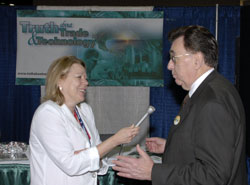Often times we hear about the added value alternative fuels such as biodiesel and ethanol bring to an area. The Seattle, WA area will begin to see those effects as it opens a major biodiesel plant.
 When it opens this summer, the Imperium Renewables plant is expected to produce 100 million gallons of biodiesel a year and will become the largest in the country. And all that biodiesel means increased shipping for the area. In fact, the Grays Harbor (WA) Daily World reports that port will see the number of cargo ships in and out of the harbor double.
When it opens this summer, the Imperium Renewables plant is expected to produce 100 million gallons of biodiesel a year and will become the largest in the country. And all that biodiesel means increased shipping for the area. In fact, the Grays Harbor (WA) Daily World reports that port will see the number of cargo ships in and out of the harbor double.
Imperium officials promise moving the green fuel will keep things green for the environment:
Brian Young, Imperium Renewables’ director of business development, said the company will deal only with experienced shippers. Imperium has its own contingency plans should spills occur while ships are loading or unloading, he added.
“We are going to take every precaution just like we were a petroleum company. Our whole theory is that nothing should spill into the water,” he said.
Port officials cannot say exactly how much more money the increased traffic will bring, but Imperium will be using smaller tankers to bring in the raw materials and barges and tugs to ship out the biodiesel.


 Two Republican senators voiced concerns Wednesday about a potential U.S.-Brazil ethanol accord.
Two Republican senators voiced concerns Wednesday about a potential U.S.-Brazil ethanol accord. South Dakota Republican John Thune argues that elimination of the tariff is counter-productive to the intention of developing a strong domestic ethanol industry. “This is something that is very good for American agricultural producers,” he said. “So it doesn’t make sense for us to be trying to develop that industry elsewhere around the world nor to make us dependent on a foreign source of energy when the whole purpose is to become less dependent on foreign sources of energy.”
South Dakota Republican John Thune argues that elimination of the tariff is counter-productive to the intention of developing a strong domestic ethanol industry. “This is something that is very good for American agricultural producers,” he said. “So it doesn’t make sense for us to be trying to develop that industry elsewhere around the world nor to make us dependent on a foreign source of energy when the whole purpose is to become less dependent on foreign sources of energy.” Ethanol industry leader
Ethanol industry leader  RFA President Bob Dinneen issued the following
RFA President Bob Dinneen issued the following  Osborn says the first race of the season is the
Osborn says the first race of the season is the  Osborn says the alternative portion is the fact that his VW runs on diesel… an alternative to the racing petrol most other racers use. And he says since it does run on diesel, there is always the possibility of another alternative… biodiesel… could make it into his racer. “The performance issues with diesel and biodiesel are sonmething at their infancies in the United States, and something we’d like to puruse.”
Osborn says the alternative portion is the fact that his VW runs on diesel… an alternative to the racing petrol most other racers use. And he says since it does run on diesel, there is always the possibility of another alternative… biodiesel… could make it into his racer. “The performance issues with diesel and biodiesel are sonmething at their infancies in the United States, and something we’d like to puruse.” While he likes to grab the checkered flag, Osborn says his racing has a bigger purpose. Chili Pepper Racing has been racing for charities for years. Now, he races for a more personal purpose. Last year, he lost his eight-week-old infant son to cancer. “Over the winter, we took some of this pain we had were feeling and tried to turn it into some positive energy and formed the Austin Hatcher Foundation for Pediatric Cancer.” Osborn says they’ll race this season in “Hatch’s” name.
While he likes to grab the checkered flag, Osborn says his racing has a bigger purpose. Chili Pepper Racing has been racing for charities for years. Now, he races for a more personal purpose. Last year, he lost his eight-week-old infant son to cancer. “Over the winter, we took some of this pain we had were feeling and tried to turn it into some positive energy and formed the Austin Hatcher Foundation for Pediatric Cancer.” Osborn says they’ll race this season in “Hatch’s” name.
 The plant will produce up to five megawatts of electricity and will run on biodiesel from a
The plant will produce up to five megawatts of electricity and will run on biodiesel from a  Imperium Renewables has announced it has achieved a BQ-9000 certification for its Seattle-based refineries.
Imperium Renewables has announced it has achieved a BQ-9000 certification for its Seattle-based refineries.  To anyone concerned about high grain prices, the impact of biofuels on the livestock industry, or whether we will have enough corn to meet all needs, Dean Kleckner has just one message: “Let the market sort it out.”
To anyone concerned about high grain prices, the impact of biofuels on the livestock industry, or whether we will have enough corn to meet all needs, Dean Kleckner has just one message: “Let the market sort it out.”
 According to
According to